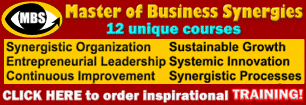|
Performance Management Evaluating and Improving Both Individual and Company Performance |
|
by Vadim Kotelnikov, Founder, Ten3 Business e-Coach for Innovative Leaders, 1000ventures.com
"One player practicing sportsmanship is far better than 50 preaching it." - Knute Rockne
|
Designing a Useful Performance Management System
|
|
Performance Management Defined "Performance management is the integrated process of objective setting, appraisal and pay determination which supports the achievement of the company's business strategies. At an individual level it will result in action plans related to performance improvement, career development and training."1 Benefits of an Effective Performance Management System When a performance management system is operated effectively, there are great benefits for both individuals and organizations. Setting Right Objectives Setting right objectives is critical for effective performance management. Such objectives as higher profits, shareholder value, customer satisfaction may be admirable, but they don't tell managers what to do. "They fail to specify priorities and focus. Such objectives don't map the journey ahead - the discovery of better value and solutions for the customer."4 The objectives must be:
Building Trust To Improve Performance Trust - both between individuals and organizations - is at the core of today's complex and rapidly changing knowledge economy. With trust as a foundation, the companies - or teams within a company - can share their know-how to achieve synergy - results that exceed the sum or the parts. "Unlike formal contracts or rigid hierarchies, trust frees partners to respond together to the unexpected, which is essential for mutual creativity. Trust also fosters enthusiasm, ensuring the best performance from everyone."8. Further, trust-based working relationships reduce the costs your firm incurs to manage or govern itself. Such relationships make it less necessary to establish formal contracts and monitor and control individual and group behaviors, thus reducing your firm's transaction costs as measured by formal contracts and organizational structures9...More Motivating Every Employee Every person has a greater potential than they are exhibiting, and as a leader, it's your responsibility to maximize their potential and performance and the results of each member of your team. "Motivation is about cultivating your human capital. The challenge lies not it the work itself, but in you, the person who creates and manages the work environment."3.. MoreEnergizing Employees "What energizes people is the broader horizon, the excitement of new challenges and big opportunities. When their leaders offer this excitement, people come alive."5 The one-on-one relationships that individual workers have with their managers, and the trust, respect, and consideration that their managers show toward them on a daily basis are also at the core of an energized workforce. "Getting the best out of workers is above all a product of the "softer" side of management - how individuals are treated, inspired, and challenged to do their best work - and the support, resources, and guidance that is provided by managers to help make exceptional employee performance a reality."6...More Coaching Coaching brings more humanity into the workplace. "Effective coaching in the workplace delivers achievement, fulfillment and joy from which both the individual and organization benefit."7 Achievement means "the delivery extraordinary results, organizational and individual goals achieved, strategies, project and plans executed. It suggests effectiveness, creativity, and innovation. Effective coaching delivers achievement, which is sustainable. Because of the emphasis on learning and because the confidence of the player (the coachee) is enhanced ('I worked it out for myself!') the increase in performance is typically sustained for a longer period and will impact on areas that were not directly the subject of coaching."7...More Unleashing the Power of Your Service-Profit Chain Unleashing the power of the service-profit chain will improve your performance. Moving from a focus on transactions to a focus on customer relationships delivers sustainable financial advantages. Your must look beyond the arithmetic value of individual transactions to all the ways you can serve the customer to capture and develop lasting relationships...More Case in Point: Hewlett-Packard Way To create an organization that could sustain its competitive advantage regardless of marketplace whims and what their competitors were building, HP founders based their corporate culture on the integration and reinforcement of critical opposites. This became known as the Hewlett-Packard Way. HP has achieved "what appears to be the greatest dichotomy: creating an environment that celebrates individualism, but at the same time one that is also wholly supportive of teamwork. Although HP people are taught to engage in cross-functional teams, they are also rated on the performance of decentralized business units and personal achievement."3...More Case in Point: General Electric (GE) Jack Welch's goal was to make GE "the world's most competitive enterprise." "We now know where productivity - real and limitless productivity - comes from. It comes from challenged, empowered, excited, rewarded teams of people," he said. Welch knew that the current business environment requires an energized, energizing leader: "You've got to be live action all day. And you've got to be able to energize others. Your cannot be this thoughtful, in-the-corner-office guru. You cannot be a moderate, balanced, thoughtful, careful articulator of policy. You've got to be on the lunatic fringe."7...More
|
Bibliography:
-
"Handbook of Performance Management ", Institute of Personnel Management, 2002
-
"Balanced Scorecard in a Week", Mike Bourne and Pippa Bourne, 2002
-
"How To Motivate Every Employee", Anne Bruce, 2003
-
"Customer Intimacy", Fred Wiersema, 1996
-
"Every Business is a Growth Business", Ram Charan and Noel. M. Tichy, 1998
-
"1001 Ways To Energize Employees", Bob Nelson, 1997
-
Jack Welch quoted in Washington Post, March 23, 1997
-
"Trusted Partners", Jordan D. Lewis, 1999
-
"Strategic Management: Competitiveness and Globalization", Edition 4, Thomson Learning, 2001




